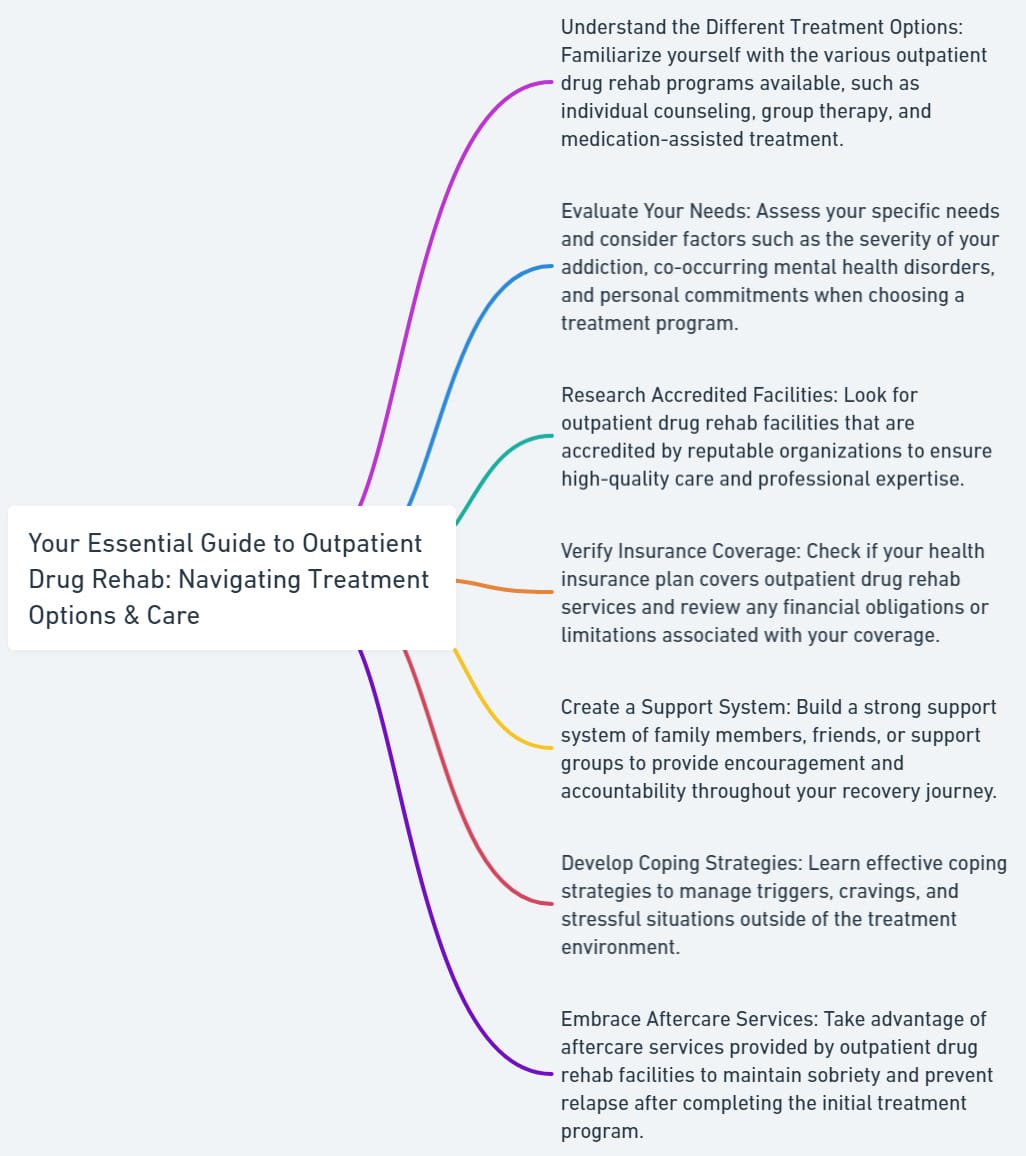Are you or a loved one struggling with addiction and considering outpatient drug rehab? You’re in the right place! In this essential guide to outpatient drug rehab, we’ll dive into the world of outpatient rehab, exploring its components, levels of care, mental health services, and how to choose the right facility for lasting recovery. Outpatient rehab offers a flexible and supportive approach to overcoming addiction, allowing individuals to maintain their daily responsibilities while receiving the care and guidance they need.
Key Takeaways
- Outpatient drug rehab centers provide comprehensive treatment services to empower individuals in their recovery journey.
- Explore and compare your options when selecting an outpatient rehab facility, it is a key part of achieving lasting sobriety.
- Family and social support play a critical role in providing encouragement, accountability, & stability for successful recovery.
Understanding Outpatient Drug Rehab
Outpatient drug rehab centers are designed to empower individuals to regain control over their lives and break free from dangerous substance use behaviors. These specialized programs provide a comprehensive suite of treatment services, mirroring those offered by residential treatment units, thus ensuring their effectiveness. Achieving and sustaining a healthy lifestyle is the main goal of treatment for many patients. It is important to maintain a balanced diet and regular exercise for better health outcomes..
Outpatient rehab can be a fantastic way to receive the help you need while still managing your daily life, making it one of the most effective outpatient treatment programs. One must remember that outpatient treatment is tailored to each patient’s individual needs, allowing for the duration to be adjusted to align with your progress and goals. Individuals with a motivated attitude and a dedicated, consistent approach may find great success in outpatient programs, such as an outpatient treatment program.
Outpatient vs. Inpatient Treatment
Outpatient rehab, with its greater accessibility and flexibility compared to inpatient programs, serves as an excellent option for those with mild to moderate addictions. With outpatient treatment, you can continue with your daily activities while still receiving the necessary support and guidance to overcome addiction. However, it’s important to recognize the potential challenges of outpatient rehab programs. It can be difficult to maintain sobriety when not under supervised care, and managing withdrawal symptoms might be more challenging without 24/7 medical assistance available by checking in to an inpatient rehab setting.
Although outpatient treatment may not be the best initial choice for everyone, many individuals in recovery from substance use disorders will eventually need to transition to outpatient treatment for further progress. Therefore, gaining a solid understanding of the advantages and potential challenges of both inpatient and outpatient treatment options is instrumental in making an informed decision about the most suitable path for your recovery.

Key Components of Outpatient Rehab Programs
Outpatient rehab programs typically consist of individual and group counseling, medication management, and support groups to help individuals overcome addiction and maintain sobriety. These essential components work together to create a comprehensive treatment plan, tailored to the unique needs and preferences of each patient.
We shall now delve into each of these key components and their roles in outpatient rehab.
Individual and Group Counseling
Counseling sessions in outpatient rehab empower patients to uncover the underlying causes of their addiction and equip them with the tools to stay sober. Individual counseling involves one-on-one sessions between a therapist and a client, focusing on the individual’s specific needs, goals, and challenges related to their addiction. The therapist provides tailored support, guidance, and interventions.
On the other hand, group counseling involves multiple individuals with similar addiction issues participating in therapy sessions together. The group dynamic allows for:
- shared experiences
- support
- feedback from peers
- creating a sense of community
- promoting empathy
- offering opportunities for interpersonal growth
Both forms of counseling are instrumental in helping patients explore the root causes of their addiction and develop coping strategies for maintaining sobriety.
Medication Management
In outpatient rehab, medication management is a critical aspect that ensures a safe and effective recovery process. It can help you feel better and stay on track, promoting a successful recovery journey. Medications such as buprenorphine, methadone, and naltrexone are commonly used in outpatient drug rehab to help manage withdrawal symptoms and cravings, ultimately assisting you in your journey to successful recovery.
Medication management is a key element of care during rehab and the initial phases of recovery, utilizing medications to help individuals with opioid use disorder (OUD) manage withdrawal symptoms, reduce cravings, and prevent relapse. These medications can replicate the effects of addictive drugs, relieving withdrawal symptoms and cravings, and aiding individuals to stay abstinent and remain in treatment, thus combating drug abuse.
Support Groups and Peer Connection

In outpatient rehab, support groups and peer connections are fundamental, providing not only ongoing encouragement and accountability, but also a sense of community and belonging. Outpatient rehab offers various types of support groups, such as:
- Therapy groups
- 12-Step programs
- Peer-led self-help groups
- Aftercare support groups
These support groups are designed to help you stay on track with your recovery journey.
Participating in support groups can be incredibly beneficial for individuals’ mental health, including:
- reducing feelings of loneliness, isolation, and judgment
- decreasing distress, depression, anxiety, and fatigue
- improving relationships with treatment providers and social supports
- increasing treatment retention
- contributing to overall personal recovery.
Furthermore, support groups provide valuable psychoeducation on various topics related to substance use disorders and offer a sense of solidarity and stigma reduction.
Levels of Care in Outpatient Treatment
Outpatient treatment provides a spectrum of care levels, ranging from intensive day programs to continuing care groups, thus enabling a personalized approach based on individual needs and progress. At RCA, you can access three types of outpatient treatment, including intensive outpatient programs and intensive outpatient treatment: Partial Hospitalization Program (PHP), Intensive Outpatient Program (IOP), and General Outpatient Program (GOP).
Depending on your unique needs and circumstances, you may begin with a more intensive level of care, such as a day treatment program, followed by a gradual transition to less intensive programs as your treatment progresses. This tailored approach ensures that you receive the appropriate level of care and support throughout your recovery journey, maximizing your chances of long-term success.
Mental Health Services in Outpatient Rehab

Outpatient rehab programs frequently incorporate mental health services, which address co-occurring disorders and promote overall well-being. Co-occurring disorders refer to the presence of both a substance use disorder and a mental health disorder, such as:
- Anxiety disorders
- Mood disorders
- Schizophrenia
- Bipolar disorder
- Major depressive disorder
It is essential to address both the substance use disorder and the co-occurring mental health disorder in order to provide comprehensive treatment for a successful recovery.
Outpatient rehab programs utilize a variety of methods to integrate mental health services, including:
- Case management
- Treatment planning
- Individual and group counseling
- Family therapy
- Patient education
- Crisis intervention
- Recovery services
These programs strive to provide comprehensive substance abuse treatment that holistically addresses both substance abuse and mental health issues, ensuring a more successful and rewarding experience in outpatient rehab. This approach aligns with the goals of the Mental Health Services Administration.
Choosing the Right Outpatient Rehab Facility
Choosing the right outpatient rehab facility is a crucial step in ensuring long-term recovery. This involves evaluating the available amenities, therapies, and financial assistance options to ensure the best fit for your needs and preferences.
Let us examine the factors to consider when selecting an outpatient rehab facility.
Evaluating Amenities and Therapies
Assessing the available amenities and therapies at outpatient rehab facilities can help individuals find a program that aligns with their needs and preferences. Outpatient rehab facilities like Lantana outpatient rehab offer an incredible range of amenities, such as:
- Equestrian centers
- Basketball courts
- Sand volleyball courts
- Labyrinths
- Gardens
- Private lakes
- Ropes courses
These amazing amenities offer recreational and therapeutic experiences to individuals in outpatient treatment.
Outpatient rehab facilities offer a wide variety of stimulating therapies, such as:
- Group and individual counseling
- Family therapy
- Education sessions
- Occupational or recreational therapy
- Psychotherapy
- Medication for addiction treatment
- Other treatment services
By evaluating the available amenities and therapies, individuals can ensure they select an outpatient rehab facility that meets their unique needs and preferences, setting them on a path to successful recovery.
Financial Assistance and Insurance Coverage
Understanding financial assistance options and insurance coverage is essential for making outpatient rehab more accessible and affordable. Some facilities offer financial assistance and sliding payment scales to help make outpatient rehab more accessible and affordable. Additionally, many insurance carriers can help cover the full or partial cost of outpatient addiction treatment.
Gaining an understanding of Medicaid and Medicare coverage for outpatient rehab is also important. Here is some information on coverage:
- Medicare Part B covers outpatient therapy services.
- Medicaid coverage for outpatient rehab may vary depending on the state, but it generally covers necessary services for substance use disorders and mental health treatment.
- Veterans can access healthcare benefits for rehab and addiction treatment through the Department of Veterans Affairs.
By understanding the financial assistance options and insurance coverage available, individuals can make an informed decision when choosing an outpatient rehab facility.
The Role of Family and Social Support in Outpatient Rehab

In outpatient rehab, family and social support are crucial, offering encouragement, accountability, and a stable environment conducive to recovery. Family support can significantly benefit someone in outpatient drug rehab by:
- Facilitating better communication
- Lessening conflict in the family
- Creating a more encouraging and stable atmosphere for the person in recovery
- Helping improve mental adjustment to addiction
- Raising the chances of a successful treatment
Family and friends can use various strategies to provide effective support during outpatient rehab, such as:
- Exploring support groups or family therapy and counseling to strengthen treatment effectiveness
- Facilitating interventions to motivate the individual to seek help for their substance abuse problem
- Accessing local resources
- Educating themselves about substance abuse and addiction
- Offering emotional support and encouragement throughout the recovery process
- Setting boundaries and establishing clear expectations to promote accountability
By employing these strategies, family and friends can create a supportive environment that increases the individual’s chances of successful recovery.
Preparing for Outpatient Treatment: Tips and Expectations
Preparation for outpatient treatment entails setting realistic expectations, building a support system, and devising a plan to manage daily responsibilities during the recovery process. It’s important to set realistic expectations for outpatient treatment by understanding that recovery is a process, recognizing the need for ongoing support, and being open to making lifestyle changes.
In addition to setting realistic expectations, it’s crucial to build a supportive network of family, friends, and professionals, including a reliable treatment provider, who can offer guidance, encouragement, and resources during the outpatient treatment process.
Lastly, creating a plan for managing daily responsibilities, such as work, school, or childcare, can help ensure a smooth transition into outpatient treatment and minimize potential stressors that could hinder the recovery process.
Relapse Prevention and Life After Outpatient Rehab
Preventing relapse and navigating life post-outpatient rehab involve securing ongoing support, practicing self-care, and developing healthy coping strategies to maintain long-term sobriety. Developing healthy coping mechanisms, managing stress effectively, building a strong social support system, prioritizing physical and mental health, and practicing self-compassion and self-acceptance are essential for staying sober after outpatient rehab.
Being aware of common triggers such as:
- stress
- social situations
- emotional triggers
- old habits and routines
- overconfidence
can also help you avoid relapse after outpatient rehab. Support from family and social circles can be a powerful tool for your success in outpatient rehab, providing you with the support, encouragement, and motivation you need.
Research has shown that social support is vital to sustained recovery for individuals with substance use disorders, increasing the chances of staying sober and playing a significant role in sustaining recovery.
Summary
In conclusion, outpatient drug rehab offers a flexible and supportive approach to overcoming addiction, allowing individuals to maintain their daily responsibilities while receiving the care and guidance they need. Key components of outpatient rehab include counseling, medication management, and support groups, which work together to create a comprehensive treatment plan tailored to each patient’s needs. By understanding the different levels of care in outpatient treatment, addressing mental health concerns, choosing the right facility, and involving family and social support in the recovery process, individuals can maximize their chances of long-term sobriety and success.
Frequently Asked Questions
What is the main difference between outpatient rehab and inpatient rehab?
Outpatient rehab gives individuals greater flexibility to continue their daily lives while still receiving treatment, unlike inpatient programs which require a stay at a rehabilitation facility.
What are the essential components of outpatient rehab programs?
Outpatient rehab programs provide invaluable support for individuals struggling with addiction, offering a combination of counseling, medication management, and support groups to help them on their path to sobriety.
How long does outpatient treatment typically last?
Outpatient treatment typically lasts as long as necessary to achieve the patient’s desired goals, ensuring everyone can benefit from tailored care.
Can insurance help cover the cost of outpatient rehab?
Yes, insurance can help cover the cost of outpatient rehab – many carriers offer coverage for either full or partial treatment fees.
Can individuals leave rehab whenever they want?
In most cases, individuals in a rehab program can choose to leave, but it’s essential to understand the implications. Leaving against professional advice can compromise the effectiveness of treatment and increase the risk of relapse. Additionally, legal or insurance consequences may arise. For a detailed answer, read our article on can you leave rehab whenever you want.
What can I do to prevent a relapse after completing outpatient rehab?
To prevent a relapse after outpatient rehab, focus on developing healthy coping mechanisms, managing stress, building strong social support, prioritizing physical and mental health, and practicing self-compassion and self-acceptance. Take these steps to help ensure long-term recovery success!



